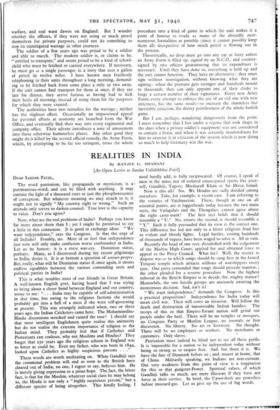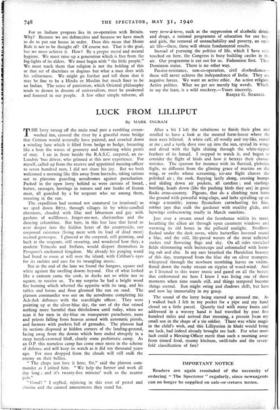REALITIES IN INDIA
By RANJEE G. SHAHANI
[An Open Letter to Sardar Vallabhbhai Patel] DEAR SARDAR PATEL, The word patriotism, like propaganda or mysticism, is a • portmanteau-word, and can be filled with anything. It may contain the light of a thousand stars or just the phosphorescence of corruption. But whatever meaning we may attach to it, it ought not to signify " My country right or wrong." Such an attitude only serves to darken counsel. True love is the capacity to value. Don't you agree?
Now, what are the real problems of India? Perhaps you know far more about them than I ; yet I might be permitted to say a little in this connexion. It is good to exchange ideas. " We want independence," says the Congress. Is that the urge of all Indians? Frankly, no. Most of us feel that independence just now will only make confusion worse confounded in India. Let us be honest: it is a mere war-cry. Dominion status, perhaps. Many, as I discovered during my recent pilgrimage to India, desire it. It is at bottom a question of amour-propre. But, really, what will be Dominion status if, once again, it means endless squabbles between the various contending sects and political parties in India?
This is what troubles most of our friends in Great Britain. A well-known English poet, having heard that I was trying to bring about a closer bond between England and our country, wrote to me: " . . . India may be capable of self-administration in due time, but owing to the religious factions she would probably get into a hell of a mess if she were self-governing at present. This was strangely indicated when, two or three years ago, the Indian Cricketers came here. The Mohammedan- Hindu dissensions wrecked and ruined the tour! I should say that most intelligent Englishmen quite realise this animosity but do not realise the extreme importance of religion to the Indian mind. They probably feel that if Catholics and Protestants can coalesce, why not Muslims and Hindus? They forget that 25o years ago the religious schism in England was as bitter as could be. Even my father, who was born in 1844, looked upon Catholics as highly suspicious persons . . ."
These words are worth meditating on. When Gandhiji says the communal problem will end as soon as the British have cleared out of India, no one, I regret to say, believes him. He is merely giving expression to a pious hope. The fact, the bitter fact, is that for the Muslim, whatever social class he may belong to, the Hindu is not only a " highly suspicious person," but a different species of being altogether. This kindly feeling, I need hardly add, is fully reciprocated. Of course, I speak of men in the mass, not of isolated emancipated spirits like your- self, Gandhiji, Tagore, Musharaff Khan or Sir Mirza Ismail Now is this all? No. We Hindus arc sadly divided among ourselves. Take, for example, a recent case. I am referring to the votaries of Vaishnavism. These, though at one on all essential points, are at loggerheads today because the two main sects, the Vadagalais and the Thengalais, cannot agree about the right caste-mark! The first sect holds that it should resemble a " U." No, retorts the second, it should resemble a " Y." Each is fully persuaded that its view is the correct one. This difference has led not only to a bitter religious feud but to violent and bloody fights. Legal battles, costing hundreds of thousands of rupees, have been waged to solve it. All in vain.
Recently the head of one sect, dissatisfied with the judgement of the Madras High Court, applied for and obtained leave to appeal to the Privy Council. What for? Well, the matter at dispute was as to which songs should be sung first in the famed Tirupati temple which attracts millions of worshippers every year. One party contended that songs should precede mantras ; the other pleaded for a reverse procedure Now the highest tribunal in the British Empire is to decide this mighty matter! Meanwhile, the two hostile groups are anxiously awaiting the momentous decision. Sad, isn't it?
" We want independence," demands the Congress. Is this a practical proposition? Independence for India today will mean civil war. Then will come an invasion. Will follow the death and destruction of innumerable Indian families. The troops of this or that Empire-Errant nation will grind our people under the heel. There will be no temples or mosques, no Congress Party or Muslim League, no journals or free discussion. No liberty. No art or literature. No thought. There will be no employers or workers. No merchants or customers. Only slaves.
Patriotism must indeed be blind not to see all these perils. It is impossible for a nation to be independent today without being so strong as to inspire fear. Sad, but there it is. We have the fate of Denmark before us ; and, nearer at home, that of China. Militarily speaking, we Indians are non-existent. Our very weakness from this point of view is a temptation for this or that gangster-Power. Spiritual values, of which Gandhiji talks so much, are mere illusions if they have not force at their service. In brief, the Upanishads are powerless before mustard-gas. Let us give up the use of big words. For us Indians progress lies in co-operation with Britain. Why? Because we are defenceless and because we have much to do to put our house in order. Does this mean that Home Rule is not to be thought of? Of course not. That is the goal, but we must achieve it. How? By a proper moral and mental hygiene. We must raise up a generation which is free from the fog-lights of its elders. We must begin with " the little people." We must teach them that religion is not the holding of this or that set of doctrines or dogmas but what a man does with his solitariness. We might go further and tell them that it may be fine to be a Hindu or Muslim but much finer to be an Indian The sense of patriotism, which Oriental philosophy tends to drown in dreams of universalism, must be awakened and fostered in our people. A few other simple reforms, all very terre-a-terre, such as the suppression of alcoholic drinks and drugs, a rational programme of education for our bo3, and girls, the removal of untouchability and poverty, an ope- air life—these, these will obtain fundamental results.
Instead of pursuing the politics of life, which I have only touched on here, the Congress is busy building castles in the air. Our programme is cut out for us. Federation first The Dominion status. There is no other way.
Passive-resistance, non--co-operation, civil disobedience— these will never achieve the independence of India. They are negative forces. We want an active ethic. An active religion. Active politics. What we get are merely big words. Which. to say the least, is a wild mockery.—Yours sincerely, RANJEE G. SHAHANI.































 Previous page
Previous page